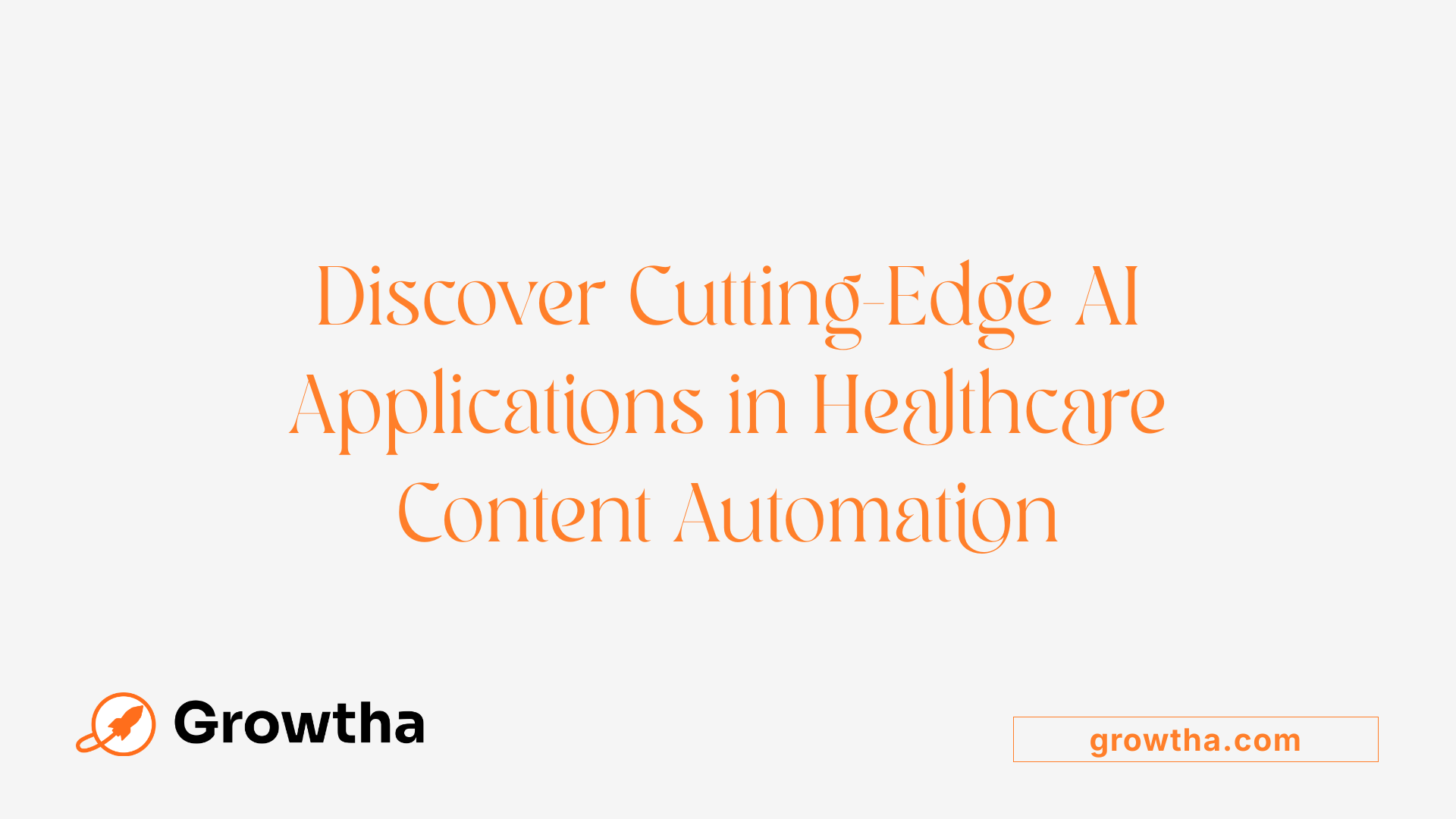Using AI to Automate Content Creation for Healthcare
Revolutionizing Healthcare Communication Through AI Innovation


Using AI to Automate Content Creation for Healthcare
Transforming Healthcare Content with Artificial Intelligence
The integration of artificial intelligence (AI) into healthcare has revolutionized the way medical organizations create, manage, and disseminate content. From automating routine administrative tasks to generating patient-specific educational materials, AI supports efficiency, accuracy, and personalization across the entire healthcare spectrum. As AI technology continues to evolve, it offers vast potential to enhance patient engagement, streamline workflows, and foster data-driven decision-making—ultimately transforming healthcare delivery and communication.
AI in Healthcare Content Strategy and Engagement

How can AI-based healthcare content strategies improve engagement and operational efficiency?
AI has revolutionized healthcare marketing by enabling more personalized and proactive communication with patients. Through advanced data analysis and generative AI tools, healthcare organizations can craft tailored content that resonates with individual patient needs and preferences. This personalization not only fosters trust but also encourages patients to participate more actively in their care, enhancing overall engagement.
AI-driven content strategies allow for the automatic creation of compelling, accessible health information. Whether through chatbots, virtual assistants, or customized educational materials, AI ensures timely and relevant communication, reducing the likelihood of missed information sharing and improving patient understanding about conditions, treatments, and services.
Operationally, AI streamlines workflows by automating routine administrative tasks such as appointment scheduling, follow-up reminders, and feedback collection. Tools like AI-powered chatbots and virtual assistants handle high-volume inquiries efficiently, freeing healthcare staff to focus on complex patient needs.
Moreover, AI improves decision-making by analyzing vast amounts of patient data, enabling healthcare providers to make informed choices quickly. This data-driven approach supports better resource allocation, cost management, and personalized treatment planning.
Connected care is further enhanced by AI applications that monitor patient health remotely, provide real-time feedback, and support early intervention. For example, AI-enabled sensors and health monitoring devices collect continuous data, alerting clinicians to potential issues before emergencies arise.
In summary, integrating AI into healthcare content and engagement strategies results in a more personalized, efficient, and patient-centered system. It not only elevates the patient experience but also optimizes operational workflows, ultimately leading to better health outcomes and more sustainable healthcare delivery.
Cutting-edge Technology in Healthcare Content Automation

What are some examples of AI applications in healthcare content automation and marketing?
AI-driven tools have revolutionized healthcare communication by automating content creation and engaging patients more effectively. Chatbots, for example, are widely used to provide health information, assist with appointment scheduling, and answer common patient queries, ensuring around-the-clock support. Automated report generation systems analyze medical data to produce summaries, discharge reports, and clinical documentation swiftly, saving time for healthcare professionals.
Patient portals powered by AI facilitate access to personal health records and educational resources, promoting patient engagement and adherence to treatment plans. In the realm of marketing, AI platforms leverage data insights to personalize health education materials and target specific patient groups with tailored messages. Virtual assistants and ambient intelligence technologies deliver proactive health advice and monitor patients remotely, further streamlining healthcare outreach and communication.
These applications not only enhance efficiency but also improve the accuracy and relevance of healthcare messaging, ensuring that patients and providers receive timely and personalized information.
Natural language processing and machine learning in healthcare content
Natural language processing (NLP) and machine learning (ML) form the backbone of many AI content automation tools. NLP enables AI systems to understand, interpret, and generate human language, making it possible to develop chatbots capable of engaging in meaningful conversations with patients. ML algorithms analyze large datasets to identify patterns and generate personalized content, such as health tips, educational materials, and alerts.
These technologies help in customizing communication based on patient demographics, medical conditions, and preferences. They also facilitate real-time content updates, ensuring information remains current and accurate.
Real-time content analysis and updates
AI-powered platforms continuously monitor referred data like patient inquiries, social media discussions, and health news to analyze sentiment and identify emerging health trends. This real-time analysis allows healthcare organizations to update educational content promptly, address misinformation, and adapt marketing strategies quickly.
Such systems flag outdated information, review content for compliance with regulations like HIPAA, and suggest necessary revisions. This dynamic approach ensures that all patient-facing materials are accurate, relevant, and engaging, ultimately enhancing trust and health literacy.
| Technology Aspect | Functionality | Impact on Healthcare Content | Examples |
|---|---|---|---|
| AI-powered Content Tools | Automate report and material creation | Faster, accurate, personalized information | DocWrightAI, Jasper.ai |
| Natural Language Processing | Understand and generate human language | Maintenance of conversational and educational content | Chatbots, virtual assistants |
| Real-time Data Monitoring | Analyze conversations, search trends | Immediate content updates, trend spotting | Sentiment analysis tools, content flagging |
By integrating these innovative technologies, healthcare organizations can significantly improve the quality, efficiency, and personalization of their communication strategies.
AI's Impact on Diagnostics, Documentation, and Patient Care

How does AI impact medical documentation, diagnostics, patient care, and healthcare processes?
AI plays a transformative role in modern healthcare by making documentation, diagnostics, and patient care more efficient, accurate, and personalized. In medical documentation, AI-powered tools automate routine tasks such as transcribing medical records, managing claims, and generating reports. This reduces administrative burdens on clinicians and minimizes human errors.
In diagnosis, AI algorithms analyze medical images, pathology slides, and other data with high precision. For example, AI systems have achieved or exceeded expert-level accuracy in detecting pneumonia, skin conditions, and heart issues. These advances enable earlier detection of diseases, timely interventions, and tailored treatment plans.
Patient care benefits from AI-driven virtual assistants, ambient intelligence, and remote monitoring technologies. These tools support continuous health tracking, personalized health guidance, and proactive interventions. AI also streamlines healthcare processes, improves workflow efficiency, and helps healthcare providers make data-driven decisions.
Despite these advancements, challenges include managing AI-related inaccuracies, safeguarding patient data privacy, navigating ethical and legal considerations, and integrating AI tools smoothly into existing healthcare systems. Continuous validation, ongoing stakeholder engagement, and responsible system deployment are essential as AI becomes an integral part of healthcare.
Automating Healthcare Documentation and Clinical Decision Support
How can AI automate content creation in healthcare?
AI plays a pivotal role in transforming healthcare documentation by automating the generation and management of medical reports, patient notes, educational materials, and marketing content. This automation not only accelerates content production but also ensures accuracy and consistency across various healthcare communications.
One of the primary applications of AI in this domain is streamlining administrative tasks such as appointment scheduling, claims processing, and electronic health records management. By automating these repetitive activities, healthcare providers can free up valuable staff time, allowing them to focus more on patient care.
AI tools also assist in producing diagnostic reports and support clinical decision-making with real-time insights. For example, AI-driven systems analyze large datasets to develop personalized treatment plans tailored to individual patient profiles. Additionally, AI-generated educational content helps improve communication between providers and patients, fostering better understanding.
In the marketing space, AI automates the creation of targeted health promotion materials, service descriptions, and FAQs, reducing manual workload and minimizing human error. These systems continuously learn from new data, refining their outputs and enhancing content quality.
Overall, AI-driven content automation in healthcare leads to more efficient workflows, reduces operational costs, and contributes to better patient outcomes by providing timely, accurate, and personalized information.
Best Practices and Tools for AI Content Automation in Healthcare
What are best practices and tools for AI-driven healthcare content automation?
Implementing AI in healthcare content management requires a focus on data quality and regulatory compliance. High-quality, accurate data are vital for training AI models that generate trustworthy medical content. Regular validation of AI outputs helps ensure that the information remains accurate, up-to-date, and compliant with laws such as HIPAA.
Selecting the right AI platforms is essential. Natural language processing (NLP) tools like ChatGPT, Hugging Face, and GENINVO’s DocWrightAI enable efficient content creation, editing, and updating. Clinical AI applications such as Aidoc, PathAI, and SAP Predictive Analytics facilitate diagnostics and workflow automation.
Integrating these tools into various healthcare processes—like patient intake, diagnostics, imaging analysis, and post-treatment follow-up—can greatly reduce administrative workload while enhancing decision-making quality.
Adopting a responsible approach involves addressing challenges like data fragmentation and building trust among healthcare professionals. Rigorous testing, ongoing monitoring, and stakeholder engagement are key to successful AI deployment.
Overall, effective AI-driven healthcare content automation combines advanced tools with responsible practices, ensuring the delivery of reliable, compliant, and patient-centered healthcare information.
Technical, Operational, and Ethical Considerations
What are the technical, operational, and ethical considerations of using AI in healthcare content creation?
Implementing AI in healthcare content creation requires careful attention to multiple domains to ensure safe, effective, and ethical use.
On the technical side, safeguarding patient information is paramount. This involves anonymizing data, encrypting sensitive information, and instituting strict access controls to prevent unauthorized use. Compliance with regulations such as HIPAA in the United States and GDPR in Europe is essential to protect privacy rights and maintain trust.
Operational challenges include maintaining the accuracy and clinical relevance of AI-generated content. Validation processes must be in place, whereby healthcare professionals verify AI outputs before publication. Regular oversight is necessary to prevent errors, ensure reliability, and establish clear accountability for content accuracy.
Ethically, addressing algorithmic bias is a major concern. AI systems trained on skewed datasets risk propagating inequalities, which can compromise fairness in patient communication and health education. Transparency and explainability of AI decisions—using methods like SHAP or LIME—are crucial for building trust among users and facilitating regulatory approval.
Respecting patient rights involves obtaining informed consent for data use, clarifying data ownership, and ensuring that patients understand how their information influences content. It is also vital to balance technological benefits with human elements such as empathy, compassion, and cultural sensitivity.
Finally, AI applications must be designed to promote health equity, avoiding reinforcement of existing disparities. Proper governance, continuous monitoring, and stakeholder engagement are necessary to address these evolving considerations effectively.
Future Trends and Developments in Healthcare AI Content Management

What are the future trends and developments in AI for healthcare content development and management?
The future of AI in healthcare content management promises significant advancements in several areas. One of the key developments will be the ongoing progress in natural language understanding, which will enable AI to produce more accurate, nuanced, and contextually relevant medical content. This will allow healthcare organizations to generate personalized patient education materials, clinician resources, and operational documentation with minimal human oversight.
Integration with electronic health records (EHRs) is also expected to expand. Such integration will allow AI systems to access real-time patient data, providing dynamic, context-aware updates and decision support tools that enhance content accuracy and relevance during clinical workflows.
Emerging AI-enabled tools like digital twins—virtual replicas of individual patients—will facilitate personalized treatment planning, proactive patient engagement, and continuous health monitoring. Virtual health assistants powered by AI will become more autonomous, handling routine inquiries, managing chronic conditions, and guiding patients through complex health journeys.
Furthermore, AI will streamline clinical and administrative content workflows by automating repetitive tasks such as documentation, reporting, and compliance checks. This automation will reduce manual effort, minimize errors, and ensure consistency across different platforms.
To realize these benefits fully, addressing challenges such as data quality, ethical considerations, regulatory compliance, and robust infrastructure development will be essential. Collectively, these trends will transform how healthcare content is created, managed, and utilized, paving the way for a more personalized, efficient, and proactive healthcare system.
Shaping the Future of Healthcare Communication with AI
As AI continues to mature and integrate more deeply into healthcare systems, its capacity to automate content creation, optimize patient engagement, and streamline operational workflows will expand exponentially. The strategic application of AI tools promises not only cost reductions and efficiency gains but also the potential for more personalized, trustworthy, and accessible healthcare communications. Ensuring ethical deployment, data security, and high-quality validation will be essential for leveraging AI’s full potential while safeguarding patient rights and privacy. The future of healthcare content management is undeniably intertwined with AI-driven innovation, fostering a more connected, efficient, and patient-centric healthcare ecosystem.
References
- AI in Healthcare Marketing: Full Guide for 2025
- Artificial intelligence in healthcare: transforming the practice of ...
- AI Automation in Healthcare: 2025 Guide to Smarter Workflows
- Should You Use Artificial Intelligence To Create Medical Content For ...
- 5 Ways AI is Revolutionizing Healthcare Content Management
- The Role of AI in Healthcare Content - Health Monitor Network
- Medical content creation in the age of generative AI - AWS
- AI-Powered Content Creation in Healthcare: A Deep Tech Perspective
- Ultimate Guide to AI for Healthcare Marketing - Aha Media Group
- Scaling gen AI in the medtech industry - McKinsey







